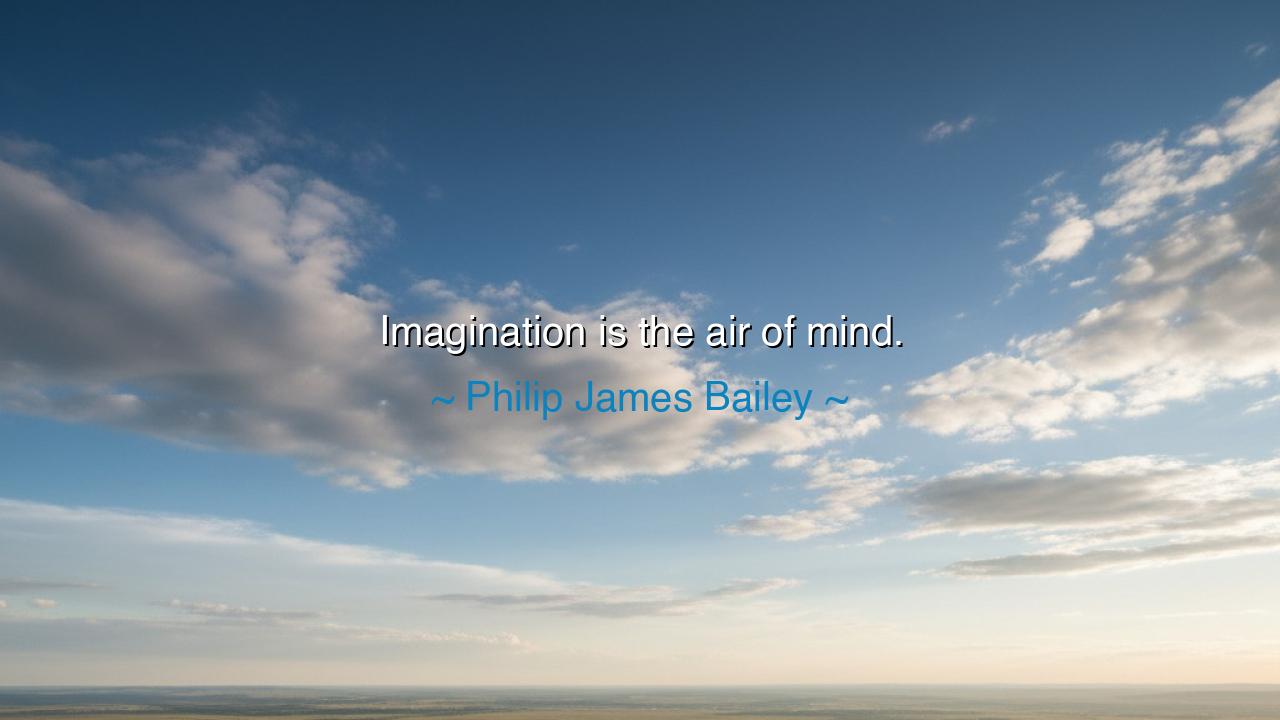
Imagination is the air of mind.






When Philip James Bailey wrote, “Imagination is the air of mind,” he spoke as one who understood the divine architecture of human thought. His words, simple yet eternal, remind us that imagination is not a luxury of the poet, nor a passing fancy of the dreamer—it is the very breath by which the mind lives. Just as the body suffocates without air, so too does the intellect wither without imagination. For the mind that ceases to imagine ceases to grow; it becomes stale, imprisoned within the walls of habit and certainty. To imagine is to inhale the infinite—to breathe in possibility itself.
Bailey, a poet of the nineteenth century, belonged to that age of Romantic visionaries who saw imagination not as escape, but as revelation. To him, the imagination was the bridge between mortal thought and divine truth, the unseen current that carried the soul toward creation and understanding. In a world becoming increasingly governed by logic and machinery, Bailey reminded his generation that the mind is not a machine of calculation but a living flame. His quote rises from this conviction: that reason orders, but imagination awakens—that without the air of imagination, the mind is like a lamp unlit.
Consider how the ancients themselves revered this truth. Plato called imagination the first step in the ascent of knowledge, for before the mind can reason, it must first envision. Leonardo da Vinci, centuries later, painted and invented not through formulas, but through the winds of his imagination—through the ability to see the unseen, to breathe ideas into forms. In his notebooks, he sketched flying machines long before humankind could dream of taking flight. His art and science were not separate acts, but the twin expressions of a mind that breathed freely. Through imagination, Leonardo transcended the limits of his age, showing that what is imagined today becomes reality tomorrow.
And yet, many forget this sacred truth. The modern mind, filled with facts but starved of vision, often forgets to breathe. We cram it with information, feed it with logic, and starve it of wonder. Without imagination, learning becomes a lifeless ritual, work becomes drudgery, and life becomes a chain of mechanical motions. But when we allow the imagination to flow—when we open the windows of the soul and let in that air—everything changes. The mundane is transformed into the miraculous. Even ordinary tasks become acts of creation, and the world itself seems to whisper new meanings.
There is a story of Albert Einstein that beautifully illustrates Bailey’s truth. When asked how he made his great discoveries, Einstein replied, “Imagination is more important than knowledge.” He said that while knowledge tells us what is, imagination shows us what could be. His theory of relativity, which reshaped the universe in human understanding, was not born in the laboratory, but in his mind—in the daydream of a young man imagining himself riding upon a beam of light. It was in that act of imagining, that great inhalation of mental air, that he transcended the boundaries of ordinary thought and touched the infinite.
To say that imagination is the air of mind is also to say that imagination is the source of vitality. When you imagine, you draw breath into your inner world; you nourish your creativity, your empathy, your capacity to see beyond appearances. The mind that imagines becomes supple, alive, radiant. It connects the past with the future, reason with emotion, self with the universe. Without it, the mind becomes narrow, gasping in the thin atmosphere of cynicism. With it, it soars freely through the boundless sky of possibility.
So, my listener, take this wisdom to heart: breathe deeply with the mind as you do with the body. Feed your soul with imagination daily. Read poetry, walk among trees, gaze at the stars, and ask questions that have no easy answers. Allow yourself to dream—not merely as escape, but as expansion. Imagine boldly, for imagination is the sacred breath that keeps your spirit alive. When you imagine, you awaken the creative fire within you, the same fire that moved prophets, poets, and pioneers.
Thus, let the teaching of Philip James Bailey become a living truth: the mind, like the body, needs air. Do not dwell in the suffocation of the ordinary. Open the windows of perception and let imagination flow through you. For in every act of imagination, you breathe the breath of creation itself—and in that breath, the human mind becomes infinite.






AAdministratorAdministrator
Welcome, honored guests. Please leave a comment, we will respond soon